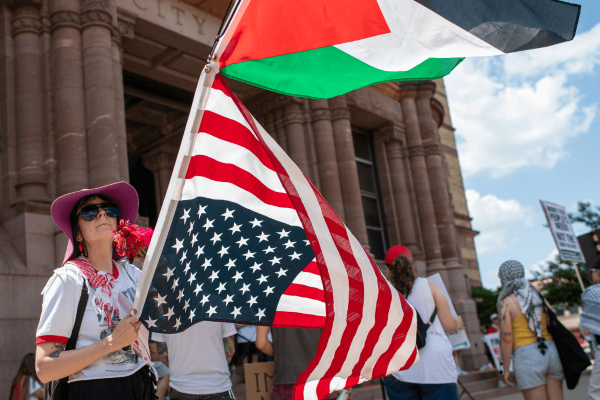Five days after Israel launched a military assault on Iran, Cardinal Dominique Mathieu, the Catholic archbishop of Tehran, spoke with Vatican News.
“I am confronted with displaced persons, the wounded, the dead. In both nations, there are many victims. It is an aerial war that has forced many to leave their homes and move to safer areas inland,” said Mathieu, who shepherds about 3,000 Iranian Catholics.
The call to break the cycle of violence is where followers of Jesus and the prophetic tradition of religious faith always begin.
That was before President Donald Trump ordered military strikes on Iran on Saturday. Acting without congressional authority, Trump ordered U.S. Central Command to execute Operation Midnight Hammer, a live-fire attack on three Iranian nuclear facilities, according to Gen. Dan Caine, chair of the Joint Chiefs of Staff at a news conference Sunday.
Trump’s own goals appear to include “regime change” in Iran and control of global oil prices, as he stated on Truth Social — despite members of his administration previously insisting regime change was not the U.S.’s goal.
“The U.S. strikes did not result in any casualties,” reported The Tehran Times, a news outlet with close ties to the Iranian government, “but earlier Israeli ones, still ongoing against civilian infrastructure across Iran, resulted in the deaths of over 400 people and injury of 2000 others.”
Rep. Thomas Massie (R-Ky.), called Trump’s decision to attack Iran unconstitutional. “When two countries are bombing each other daily in a hot war, and a third country joins the bombing, that’s an act of war. I’m amazed at the mental gymnastics being undertaken by neocons in DC (and their social media bots) to say we aren’t at war … so they can make war,” Massie wrote on social media on Sunday.
The Atomic Energy Organization of Iran confirmed there were attacks early Sunday at all three nuclear sites. The U.N. International Atomic Energy Agency reported Sunday that regional monitors had not detected any increase in radiation levels at key nuclear sites in Iran following U.S. air strikes. The IAEA inspectors are in Iran. Director Rafael Mariano Grossi called for a ceasefire so that the teams can access the impacted sites.
How this happened
In the flurry of reports, declarations of success, vows of resistance, and inconclusive analysis that has filled the news in the days since the U.S. strike on Iran, let’s remember the larger picture of what happened, and why:
For the first time, the United States has attacked the nuclear facilities and infrastructure of a sovereign nation. All previous efforts to limit the proliferation of nuclear weapons have been accomplished through diplomacy and forms of international pressure and collaboration, never through a direct military attack.
We also need to be clear: Iran did not possess a nuclear weapon. Iran was enriching uranium needed for such a weapon and had recently increased its production, but intelligence assessments concluded they had not made a final decisionto produce a bomb. In fact, the assessment said Iran would be more likely to produce a weapon if the U.S. attacked its uranium supply.
In 2018, Trump destroyed extensive measures that restrained Iran’s capacity to acquire a nuclear weapon.
It is also important to remember that Trump destroyed extensive measures that restrained Iran’s capacity to acquire a nuclear weapon. That denuclearization treaty, called the Joint Comprehensive Plan of Action, took 20 months to negotiate and was agreed to in July 2015 between Iran and the U.S., China, Russia, the United Kingdom, France, Germany, and the European Union. But in 2018, during his first term, Trump withdrew the U.S. from the agreement, unwilling to credit President Barack Obama with any accomplishment. That withdrawal set in motion the actions eventually resulting in Trump authorizing the attack on Iran. All this was preventable.
In Trump’s second presidency, he initially sought a negotiated agreement to end Iran’s ability to acquire a nuclear weapon, bragging that he was near a “deal” through his emissary, Steve Witkoff. On June 13, Israeli Prime Minister Benjamin Netanyahu launched a unilateral military attack on Iran without the approval of the U.S., but lured Trump into involvement and support for Israel because the attack was showing some tactical success.
Trump’s decision has now brought the U.S. into a closer alliance than ever with Netanyahu and his right-wing allies, who support aggressive military action over negotiations in all conflicts, including with the Palestinian people.
Deploying U.S. military forces in a concerted attack with highly destructive weapons against a sovereign country is an act of war and a clear violation of the U.S. Constitution which gives Congress the sole power to declare war.
The potential for retaliation
While it is unlikely that Iran will respond with a direct military campaign on U.S. soil, it has threatened terrorist attacks and already has tried to retaliate against the 40,000 U.S. troops stationed around the Middle East.
On Sunday Iran increased retaliatory attacks against Israel. According to Middle East Monitor, Iran launched a large-scale missile barrage targeting multiple locations across Israel, striking Haifa, Tel Aviv, and other locations across Israel’s coastal and central regions. Israeli Channel 14 confirmed that five Iranian missiles hit Israeli territory, three in the Haifa area and two in central Israel.
Since Israel launched airstrikes June 13 on several sites across Iran, Israeli authorities said at least 25 people have been killed and hundreds injured. The Iranian Health Ministry reports 430 people have been killed and more than 3,500 wounded in the Israeli assault. In Gaza, Israel has killed more than 56,000 people since Oct. 7, 2024, including hundreds killed recently while trying to access humanitarian aid.
The International Committee of the Red Cross released a statement Sunday: “The world cannot absorb limitless war. Upholding international humanitarian law is not a choice — it is an obligation.”
The Iranian regime is corrupt, repressive, and deeply unpopular, with the support of no more than 20% of the population. But the history of U.S. involvement in the Middle East shows that bombs and external intervention never lead to better lives for people suffering under these regimes.
Further, the U.S. military attack on Iran will poison the relationship between 90 million Iranian people and the U.S. for at least another generation. While Iranians mostly despise their present regime, they have never forgotten how instrumental the CIA was in destroying their political hopes and bringing the Shah of Iran into power, neither will they forget this assault by the U.S. on the sovereignty of their nation.
The role of religious peacemakers
What is the role, then, for people of faith? History provides a testimony of how aggressive, unilateral military actions, even with narrow aims, nearly always spiral out of control, with unexpected consequences intensifying the conflict and creating wider insecurity. This is a precarious moment. Here is what those committed to a compelling vision of God’s justice and peace should remember and announce:
First, we must repeat the consistent prophetic warning not to place our trust in “chariots and horses” (Psalm 20:7) or in military might to achieve any peaceful goal. Might does not make right. The call to break the cycle of violence is where followers of Jesus and the prophetic tradition of religious faith always begin.
Second, we must denounce every attempt to use language invoking the blessing of God to justify acts of military terror and destruction. In Trump’s four-minute speech justifying his attack, he named God five times. Trump said, “I want to just thank everybody, in particular, God.” To conflate God with nationalistic, military power is a heresy that every God-fearing person should condemn, regardless of their political affiliation.
Third, particularly in this conflict, faithful Christians must join with our Jewish allies in clearly rejecting attempts to confer God’s unique favor or blessing on the modern state of Israel, its actions, or its geographic boundaries. There can and must be legitimate opposition to the policies of the government of Israel, including its war on Gaza, while protecting and defending Jews, Israelis, and Jewish institutions around the world. Because of the terrible history of Christian antisemitism, Christian witness must always protect the intrinsic relationship between the Jewish and Christian people and our religious traditions. And we must maintain a prophetic clarity that holds the modern state of Israel — like every other nation — accountable to demands of God’s justice and embrace of the stranger that is embedded in the Hebrew Scriptures and in the message of Jesus.
Fourth, we cannot bomb our way to peace. The only path for nuclear security is denuclearization. People of faith must be steadfast in advocating for the elimination of all nuclear weapons. We must be clear that nations will never be effectively prevented from acquiring nuclear weapons by being bombed by other nations that already possess them, including the U.S. and Israel. That is a recipe for further nuclear escalation.
Nuclear nonproliferation objectives in Iran should be linked to broader denuclearization goals, including the creation of a Middle East zone free of weapons of mass destruction. The U.S. and other nuclear–armed countries would be in a stronger position to prevent the spread of nuclear weapons if they took the necessary steps toward eliminating their own nuclear arsenals.
In Vatican News, Tehran’s Cardinal Mathieu explained that this is a war without troops facing each other in opposition. “There is no common border where they can come into contact” Mathieu said. “So everything takes place in the airspace, where missiles and drones clash — essentially an asymmetric conflict in which the airspace of other nations is systematically violated.”
In moments like this, people of faith are confronting some of history’s oldest and most powerful myths, which try to wed the presence of God with nationalistic trust in military might, ignoring that human suffering is always its consequence.
Mathieu urged a return to negotiations. He concluded his statements by recalling the words of Ephesians 2:14, “in which it is written that Jesus ‘has made the two into one people,’ breaking down the wall of separation between them — that is, the hostility between us.”
Got something to say about what you're reading? We value your feedback!







